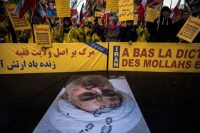Why the Arab World Needs Democracy Now
Jamal Khashoggi, the Saudi Arabian journalist who was killed by Saudi agents inside the Saudi consulate in Istanbul on Oct. 2, was the keynote speaker at a conference in April organized by the Center for Middle East Studies at the University of Denver and the Center for the Study of Islam and Democracy in Washington. Excerpts from his speech, edited for clarity and length, are below.
I am from Saudi Arabia, where the issues of democracy and Islam are very much relevant. When a Saudi official wanted to brush away the question of democracy, in the past, he would always raise the question of whether democracy is compatible with Islam.… Seguir leyendo »






